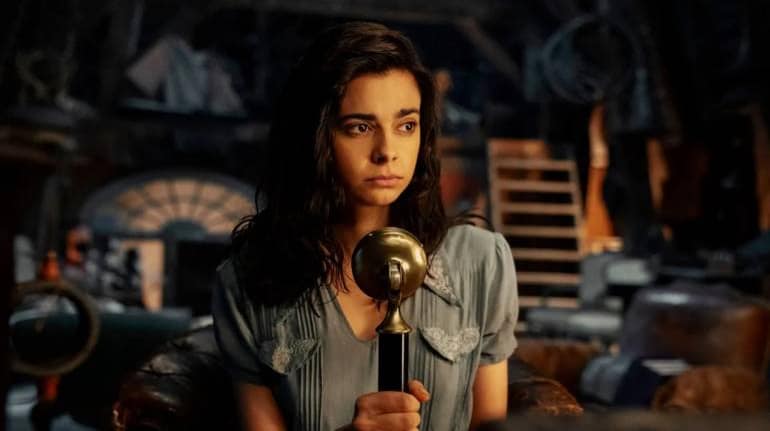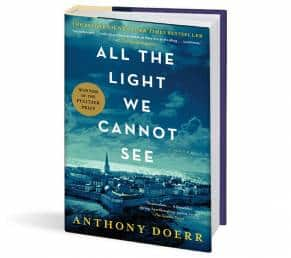



In 2014, Anthony Doerr published All the Light We Cannot See, a sprawling World War II novel over a decade in the making. The book, which went on to win the Pulitzer Prize for Fiction, centred two characters: a blind French girl called Marie-Laure LeBlanc who flees Paris after the Nazis bomb the city, and an intelligent young German boy called Werner Pfennig who is sent to military school because of his radio skills. Through their stories, which begin to intersect more and more through the course of the novel, Doerr unleashes an array of delightful meditations on science vs nature, the ethical concerns around military science, and the things that make every single human being on the planet vulnerable.
On Thursday, Netflix released the miniseries adaptation of All the Light We Cannot See, four hourlong episodes starring Aria Mia Loberti as Marie-Laure and Louis Hoffmann as Werner, plus A-listers Hugh Laurie as Marie-Laure’s World War I veteran uncle Etienne and Mark Ruffalo as her father Daniel, a locksmith. The show is visually impressive and has some great transition sequences, top-notch wartime scenes, admirable cinematography, and some very sincere performances. And yet, it will go down as a missed opportunity because it fails to capture the tonality of the novel — where the book is lyrical and grand, the show tries to mix the profoundness of the philosophical concerns with some Hollywood-style quips. While humour is seldom unwelcome, here it adds up to a bit of a tonal hotch-potch.

For example, one of the big themes of the novel is science and ethics. To illustrate this, the novel has a brilliant sequence where Marie-Laure is thinking about the novelist Jules Verne, whose works often showed readers the dangers of ‘scientism’ ie the belief that science is the key to solving every single problem humanity has.
“A line comes back to Marie-Laure from Jules Verne: Science, my lad, is made up of mistakes, but they are mistakes which it is useful to make, because they lead little by little to the truth.”
In the miniseries, however, this theme is mainly depicted visually, with voiceovers talking over visuals of wartime suffering — boys with their limbs torn apart, boys returning home in neatly lined coffins. To me this style was low-hanging fruit. Surely, with such a talented cast and crew showrunners Steven Knight and Shawn Levy could have found more creative ways to communicate this theme. It comes across as a little bit outdated, in my opinion.
Hugh Laurie and Mark Ruffalo are both superb in their roles as Marie-Laure’s uncle Etienne and father Daniel, respectively. Laurie’s character is a very layered one in the novel — a World War I veteran who suffers from PTSD and introduces his niece to the pleasures of reading and knowledge and science. It’s a classic mentor role, one that has been handled with a great deal of nuance in the book. In the miniseries, however, Etienne almost…wise-cracks, which really isn’t him. Granted, Laurie does the ‘grouch with a heart of gold’ routine as well as he used to when he was playing Dr House. But beyond a point, the dissonance becomes harder and harder to ignore.
“The brain is locked in total darkness, of course, children, says the voice. It floats in a clear liquid inside the skull, never in the light. And yet the world it constructs in the mind is full of light. It brims with color and movement. So how, children, does the brain, which lives without a spark of light, build for us a world full of light?”
In the novel, this is the kind of thing that Etienne says and we listen to him like twinkle-eyed children hypnotised by tall tales. In the film, however, the mentor is more in the Yoda mode: taciturn and moody and distinctly Americanised.
Which isn’t to say the show is all bad. For example, it does much better with Werner’s character; and trust me there’s a lot that could have gone wrong here. It’s all very well to bring out the humanity of a German Nazi character, but just look at John Boyne’s The Boy in the Striped Pajamas, which tried to do something similar and failed abysmally. Both the book and the film featured an 8-year-old German boy whose father is the commandant of Auschwitz — and somehow, his back garden is connected to a different concentration camp, because of which he ends up befriending a young Polish boy, a Jew who is interred there. This kind of ‘ersatz humanity’ does more harm than good for Holocaust survivors and their descendants. Luckily, All the Light We Cannot See is far too smart for this. Both the book and Steven Knight’s screenplay refuse to let Werner off the hook — he is an adult and ultimately bears responsibility for his actions. They never try to make this a cutesy or heartwarming moment. They don’t insult the reader/viewer’s intelligence that way.
All the Light We Cannot See is a flawed, messy adaptation of a near-perfect novel. While fans of the book will be disappointed, there’s plenty here for newcomers to enjoy despite the show’s missteps.
Discover the latest Business News, Sensex, and Nifty updates. Obtain Personal Finance insights, tax queries, and expert opinions on Moneycontrol or download the Moneycontrol App to stay updated!
Find the best of Al News in one place, specially curated for you every weekend.
Stay on top of the latest tech trends and biggest startup news.